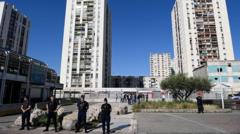Authorities in Nîmes are responding to a surge in drug-related violence by instituting night-time curfews for young people. Recently, Nîmes has faced alarming incidents, including daylight shootings that resulted in one fatality and multiple injuries. A 19-year-old man was discovered partially burned on the city's outskirts, prompting increased police presence as well.
Mayor Jean-Paul Fournier announced the curfew, set from 9 p.m. to 6 a.m., citing an "untenable" situation created by drug traffickers who have fostered a "climate of fear and terror." The deputy mayor, Richard Schieven, underlined the importance of these measures in safeguarding minors, particularly highlighting the vulnerability of children aged 12 to 13 who may be preyed upon by traffickers.
Béziers, located 120 kilometers southwest of Nîmes, has had a curfew for those under 13 established since last year, which expanded to include under 15s in select areas earlier this year. Mayor Robert Ménard remarked on the futility of having young children on the streets at late hours, asserting that such scenarios predominantly lead to mischief. Despite the curfews, violence persists; recently, youths in balaclavas attacked police with fireworks.
In Limoges, southwest France, similar curfew measures have also failed to deter youth violence, as evidenced by a weekend incident involving over 100 individuals. Mayor Émile Roger Lombertie expressed frustration over the lack of effective enforcement and suggested that additional police personnel are necessary.
The rise in drug-related violence is a growing concern across France, extending beyond the traditional hotbed of Marseille, which has long been synonymous with gang warfare. The French interior ministry reports that 110 individuals died, and over 300 others suffered injuries due to drug-related violence in 2024 alone.
To combat this escalating crisis, Interior Minister Gérard Darmanin along with Justice Minister Bruno Retailleau has advocated for intensive legislative measures, enabling the establishment of high-security prisons for drug offenders and augmenting investigative powers amid a governmental crackdown. Recently, 17 notorious drug traffickers were relocated to a high-security facility in northern France, a move reflecting the government's firm stance against drug-related crime.
In spring, a wave of arson and gunfire incidents at French prisons was widely attributed to retaliatory actions by drug gangs in response to the state’s increasing measures against them.
Mayor Jean-Paul Fournier announced the curfew, set from 9 p.m. to 6 a.m., citing an "untenable" situation created by drug traffickers who have fostered a "climate of fear and terror." The deputy mayor, Richard Schieven, underlined the importance of these measures in safeguarding minors, particularly highlighting the vulnerability of children aged 12 to 13 who may be preyed upon by traffickers.
Béziers, located 120 kilometers southwest of Nîmes, has had a curfew for those under 13 established since last year, which expanded to include under 15s in select areas earlier this year. Mayor Robert Ménard remarked on the futility of having young children on the streets at late hours, asserting that such scenarios predominantly lead to mischief. Despite the curfews, violence persists; recently, youths in balaclavas attacked police with fireworks.
In Limoges, southwest France, similar curfew measures have also failed to deter youth violence, as evidenced by a weekend incident involving over 100 individuals. Mayor Émile Roger Lombertie expressed frustration over the lack of effective enforcement and suggested that additional police personnel are necessary.
The rise in drug-related violence is a growing concern across France, extending beyond the traditional hotbed of Marseille, which has long been synonymous with gang warfare. The French interior ministry reports that 110 individuals died, and over 300 others suffered injuries due to drug-related violence in 2024 alone.
To combat this escalating crisis, Interior Minister Gérard Darmanin along with Justice Minister Bruno Retailleau has advocated for intensive legislative measures, enabling the establishment of high-security prisons for drug offenders and augmenting investigative powers amid a governmental crackdown. Recently, 17 notorious drug traffickers were relocated to a high-security facility in northern France, a move reflecting the government's firm stance against drug-related crime.
In spring, a wave of arson and gunfire incidents at French prisons was widely attributed to retaliatory actions by drug gangs in response to the state’s increasing measures against them.
















